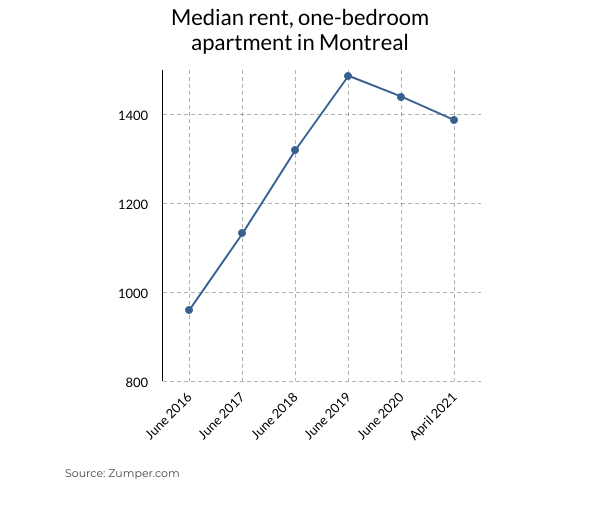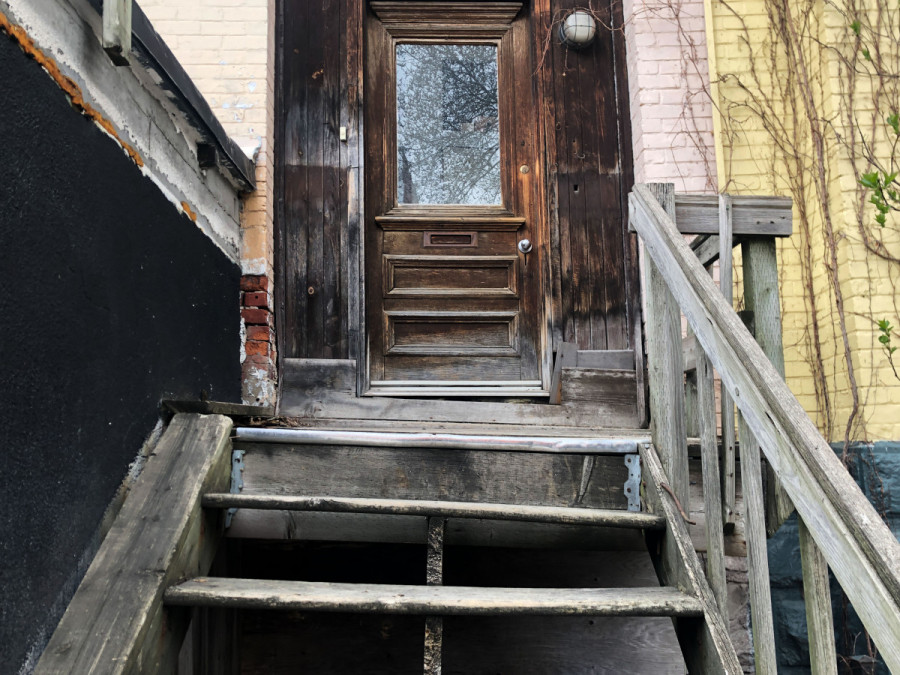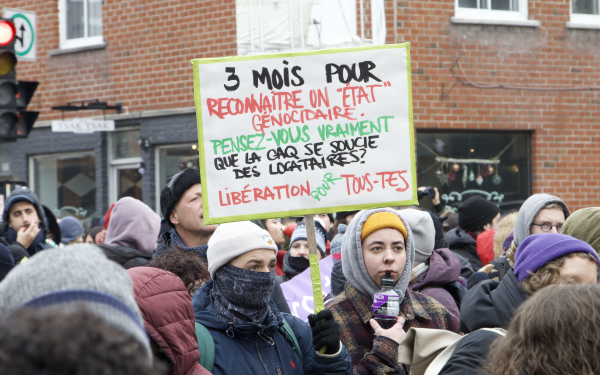Know your housing rights
The RCLALQ’s Maxime Roy-Allard explains how to stand up to your Montreal landlord
Montreal once enjoyed a reputation as a bastion of affordable housing, but those days are gone.
Nowadays, many landlords are embracing creative ways to rid themselves of longtime tenants in a bid to lease their units at higher prices.
To learn more about how tenants can protect themselves, The Link interviewed Maxime Roy-Allard, spokesperson for an association of housing committees known as the Regroupement des comités logement et associations de locataires du Québec. Here are his tips on how tenants can spot a dirty trick and fight back against landlords who exploit a system that commodifies a basic need.
This interview has been edited for length and clarity.
Q: How do Montreal tenant protections compare to other Canadian cities?
It’s provincial. Quebec tenants are better protected from renoviction because when the landlord does major repairs, the tenants have the right to come back to the apartment. It’s not the case in every province in Canada. But that’s on paper. If you look at reality, tenants don’t come back afterwards most of the time because the landlords actually ask them to sign a piece of paper that says that they give away their lease. That’s what’s happening.
But then if you compare Quebec and Ontario regarding non-payment for tenants who are late in their rent, Ontario tenants are way better protected. We can say people have a second chance in Ontario, and in Quebec it’s very quick. If you’re late in the rent for three weeks, your landlord can actually go to the tribunal and evict you.
Q: What are some common ways landlords get around tenant protections?
They send fake eviction notices. They kind of rewrite the law, really. They’ll send someone to the door and ask the tenant to sign a piece of paper that says they agree to leave their apartment. Afterwards, tenants come and see us and say, “I signed that, but I don’t want to leave. What can I do?” But usually it’s too late. Another tactic is offering money. Again, if you sign anything, if you accept any money, there’s nothing we can really do afterwards to keep you in your apartment.
Also major repairs—if, for instance, a landlord evicts some of the tenants in the building, but some others did not agree to leave, the landlord’s going to start repairs in the apartment next to the tenants and basically make their life hell.
Q: Do landlords sometimes try to get around the rules by avoiding written notices and just telling people they have to leave?
Yes. We see that, just verbal notification or a phone call. Unfortunately, many tenants actually agree to that because they don’t know their rights very well and they think landlords must know better, but that’s not the case. Many landlords actually act in bad faith and lie to tenants to convince them to leave.
Q: Your landlord tells you you’ll need to move out soon. What should you do?
Tenants need to know their lease is automatically renewed every year, and your landlord can only evict you for certain reasons. The two main exceptions are repossession of the dwelling—to put your mother or your son in the apartment, for instance—and the other is if you want to enlarge or subdivide your apartment. If the eviction notice is not about that, you should be really careful. Do not sign anything on the spot. Go and ask a housing committee for some help, and they will explain to you what your rights are.
But if we’re only talking about major repairs and there’s no subdivision or enlargement of the apartment, the tenants keep the right to come back afterwards, and at the time of the evacuation, the landlord has to pay any fees that are not normal. If you need to find a new place, if you need to go to a hotel or go to a restaurant, your landlord needs to reimburse you. Many tenants don’t know their rights about major repairs and think they can’t come back afterwards.
Q: If it is to enlarge or subdivide the unit, are they entitled to a payment from the landlord?
Yes. Three months plus moving fees.

Q: Why might a landlord prefer to get you out verbally instead of with written notice?
Because with the written notice you could go to your local housing committee and ask them if it’s okay, whereas when it’s verbal, it’s kind of hard to tell exactly what happened. It’s harder to go to court with that as well because if it goes to court, it’s going to be your word against his word, and that’s always harder. Especially where landlords are usually more organized and they know their rights and they have more money to fight you.
Q: Do you have situations where a landlord says, for instance, their son needs the apartment, so you have to move out, and next thing you know the apartment is on the rental market again?
Oh yeah. All the time. Tenants don’t usually fight the repossession. They just want to find a new place and forget about this, and that’s a problem because the tribunal does not do an inspection afterwards to see if the project that was intended really happened. So that’s a pretty big problem.
Q: How can you fight a lazy or cheap landlord who won’t make repairs you need?
In Montreal, there’s two ways you can act on that. First, you can contact the city. City inspectors can come in and see if it’s dangerous or if some repairs need to be done. They can force the landlord to do something or face fines. Also, you can always open a case at the Tribunal administratif du logement to ask the tribunal to force the landlord to do repairs, and you can get a reduction of your rent for some time if it was bad.
Q: What should you do if you fall behind on your rent? How can you fight an eviction if it comes to that, and what resources are there for you?
There’s not that many resources. That’s really sad. So, if your rent is more than three weeks late, your landlord can go to the tribunal and ask for the money and also for your eviction. The only way to stay, really, is to pay back what you owe before the court releases the decision. Otherwise, it’s very harsh. We have a really harsh system of non-payment eviction in Quebec. We’ve been fighting this for a really long time, but the government does not do anything about this.
Q: Sometimes people want to deal with apartment problems by withholding their rent. Is this a mistake?
Yes. It can be really dangerous because your landlord can open a case against you for non-payment or late rent, and the judges really don’t like tenants who do that, so it’s really tricky.
Q: What are some reasons you find tenants are hesitant to take their landlord to the Tribunal administratif du logement?
To be honest, in so many cases tenants are afraid in general to fight their landlords and go to confront their landlords at the tribunal. In most cases, tenants are reluctant to open cases against their landlord because they’re afraid of the repercussions.
If you ask your landlord to do some repairs and they don’t do anything, it’s their obligation to act. If they do not, the only solution is to go to the housing tribunal and force them to do so, to act and do the repairs, or some landlords can do some pretty bad things like calling their tenants at any time of the day to try to force them out. You can also open a case against your landlord at the tribunal to stop them from doing that.
Q: Have you ever had somebody take their landlord to the tribunal for a good reason, and next month they get a repossession notice?
First, for repossession of dwelling, notice needs to be sent six months before the end of the lease. But we see that quite often, landlords fighting back against tenants that fight back for their rights. It’s always in the minds of tenants, I think. That’s why tenants need to be better protected.
Q: Should people decline their rent increases?
It depends. You need to calculate it before you refuse it because it could go against you. Let’s say your landlord asks for $20 and it accords with the guidelines, if you refuse it and your landlord goes to the court, they might get $30, and you will have to pay for the fees too for the case, so that can be dangerous. Before refusing, tenants should contact their housing committee. They will help you calculate what you should accept.
Q: What should you do if you’re apartment hunting and the landlord is asking for something that is against the rules, like a last month’s rent deposit?
Again, that’s very tricky, because if you say it’s illegal, the landlord’s not going to rent to you. You could pay it and, when the lease is signed, tell your landlord the security deposit is not allowed, so the next month of rent is going to be reduced by this amount of money. If you go to the tribunal you’d probably win. That’s the thing, there’s the law on paper, and there’s those power dynamics between landlords and tenants. If tenants actually go against a landlord and say no, that’s illegal, they’re going to be the loser because they’re not going to get the apartment. That’s the problem here.
Q: What can we do to change the system?
Well, we have many demands for the Quebec government. It needs to implement actual rent control and a rent registry. It needs to change the law to stop evictions, to make them illegal, and give landlords huge fines for illegal evictions. Right now, there’s nothing that stops them. They’re not afraid of doing it. There needs to be huge consequences for them if they don’t follow the law.
Q: What about on an individual level. What can we do to try and fight against rising rents?
What we recommend to tenants is, when they have an affordable apartment, they should transfer the lease to another person so landlords won’t be able to increase the rent by that much. That’s a really easy way to kind of fight rent increases. When you move out, you should also leave your lease to the next tenant, so they will know what the previous rent was and they might fight it. When you move in, if the landlord increased the rent by too much, you can open a case with the rental board.
The landlord actually has the obligation to put the information on the lease, but very often they don’t do it, and there’s no consequence. There’s no fine, there’s no nothing.
Since we don’t have a rent registry, it’s very problematic, because you never know beforehand what the previous rent was. Of course, not many people want to go against the rent they just agreed to. Especially when you know your landlord’s going to be really not happy with you afterwards.
Q: How important are the Comités logement in the fight to rebalance power between tenants and landlords?
They are very important in helping tenants know their rights and help them on an individual level to fight their landlords. On a collective level, they have advocated for some improvements in tenant protections over the years and, more importantly, to stop some reforms that were giving landlords more power.
I think that’s the main difference between Quebec and the rest of Canada, where there’s no such thing as housing committees—not in the way there is in Quebec. We have more than 50 housing committees in cities, many in neighbourhoods in Montreal. They’ve been fighting for more than 45 years now. It’s better here than it is elsewhere. It’s still not perfect. Right now, I think we’re losing a lot with this huge rent increase in Montreal and elsewhere. We might become the next Toronto pretty soon, but I think we’ve been quite successful in that.
Q: How important is it to the vitality of Montreal that we protect affordable housing?
If nothing is done to keep rent affordable, we’re going to lose a lot. The diversity of the city is going to be lost forever, especially in central neighbourhoods. You won’t find any low-income households anymore if nothing is done, and I think that’s what happened in Vancouver and in many big cities around the world. We don’t want Montreal to become the next of these cities. That’s why we need to implement rent control and a rent registry, to build more social housing—to keep Montreal for everyone.
Q: If someone has an issue and they need more information or need help, who should they contact?
On our website there’s a list of housing committees in Montreal and elsewhere. They need to find the nearest organization and call them so they can get help from them.
This article originally appeared in The Resistance Issue, published April 13, 2021.




_600_375_s_c1.png)

_600_375_90_s_c1.jpg)